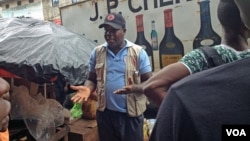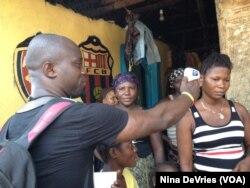It has been one year since the government of Sierra Leone declared the Ebola virus as a national emergency. In September 2014, the United Nations created a temporary system to meet the immediate needs in the fight against the deadly virus, which has killed more than 11,000 people across West Africa.
It was known as UNMEER, or the United Nations Mission for the Ebola Emergency Response. Its mission is winding down in Sierra Leone at the end of this week. This comes amid concern about a cluster of possible new cases.
The latest report from the World Health Organization puts the number of Ebola cases at their lowest weekly total this year in Sierra Leone and Guinea.
The fight, however, is not over. There is concern about a recent Ebola death in the district of Tonkolili in the northern part of the country.
A man who had been selling eggs in Freetown and then traveled to Tonkolili became ill there and died.
The virus was confirmed after postmortem testing. The district had previously gone 150 days without an Ebola case and authorities say this case could pose a substantial risk of more transmission.
More than 500 contacts have been traced so far, according to the WHO.
Social mobilization
Joseph Garber is working with the Red Cross. Part of his job is to visit the area where the man worked in Freetown, educating people about the disease, and urging them to get tested if they are showing any Ebola symptoms, such as vomiting or diarrhea.
It was this kind of work, known as social mobilization, that UNMEER helped establish, along with partners such as the Red Cross.
Although the mission is ending, Garber said he is confident those remaining in the fight will be able to carry on until the country has zero Ebola cases.
“We’re engaging with the communities; we’re telling them, that people are now gaining awareness about the disease. I think we can still handle things,” he said.
WHO steps up
UNMEER worked with various local and international partners and the government in Sierra Leone.
It is the WHO that will be taking over, said Dr. Anders Nordstrom, head of the WHO office in Sierra Leone.
“WHO will now perform two functions - one to be, as asked by U.N. system, to be the convener of the inter-agency response, the role UNMEER had; but now we’re doing it on a smaller scale and then WHO will continue its technical function, to provide the best technical advice to government,” said Nordstrom.
He admitted a lot of work remains to be done. One of the biggest challenges now is making sure all those in the fight against the disease do not lose momentum.





